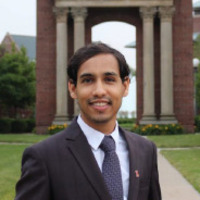Soumitra Athavale - California Institute of Technology
Seminars and Colloquia
Tales in Molecular Evolution: From Chiral Symmetry Breaking to New-to-Nature Biocatalysis
Bio: Born and raised in India, Soumitra did his BS-MS in Chemistry and Biology at the Indian Institute of Science Education and Research (IISER) Pune. In the US, Soumitra completed his doctoral studies at the University of Illinois, Urbana-Champaign under the supervision of Prof. Scott Denmark. His research was focused on elucidating the mechanism of the Soai reaction – an extraordinary transformation displaying the unique phenomenon of amplifying asymmetric autocatalysis. Currently, he is a postdoctoral scholar in Prof. Frances Arnold’s group at the California Institute of Technology, where his work is focused on the development of new-to-nature nitrene transfer reactions with hemeproteins. In 2020, competing as a solo participant, Soumitra was the co-winner of the Merck Compound Challenge, a retrosynthesis competition where teams from around the world compete to come up with a route for a target small molecule.
Abstract: The evolutionary journey of chemistry on our planet, from small molecules to genetic polymers, presents fascinating opportunities for the organic chemist. At one end, mysterious early steps evoke grand questions at the foundations of chemistry, while at the other, biology’s extraordinary machinery lies primed for creative manipulation.
An illustration of the former is the riddle of the origin of biological homochirality, inspiring the general query, ‘can asymmetric synthesis transpire without any chiral intervention’? The Soai reaction – diisopropylzinc alkylation of pyrimidine carbaldehydes – remains a singular, celebrated example where this is possible and has received widespread attention from diverse chemical fields. I will present structural, experimental, and computational investigations which reveal the first comprehensive mechanistic picture of this iconic transformation.
For the latter case, I will showcase how the principles of directed evolution can be applied to develop new enzymes for promoting processes never seen in nature. The engineering of heme proteins enables enantioselective catalysis of challenging nitrene C–H insertion reactions for accessing nitrogen containing compounds from feedstock chemicals. This example of ‘new-to-nature biocatalysis’ is emblematic of a modern age of protein biochemistry that promises to revolutionize the use of enzymes for molecular construction.
Join Zoom Meeting
https://dartmouth.zoom.us/j/96492319907?pwd=b29iOENyRlRiRmd1WUx6V0ltdWFqZz09
ID: 945 9829 6201
Passcode: 683915
